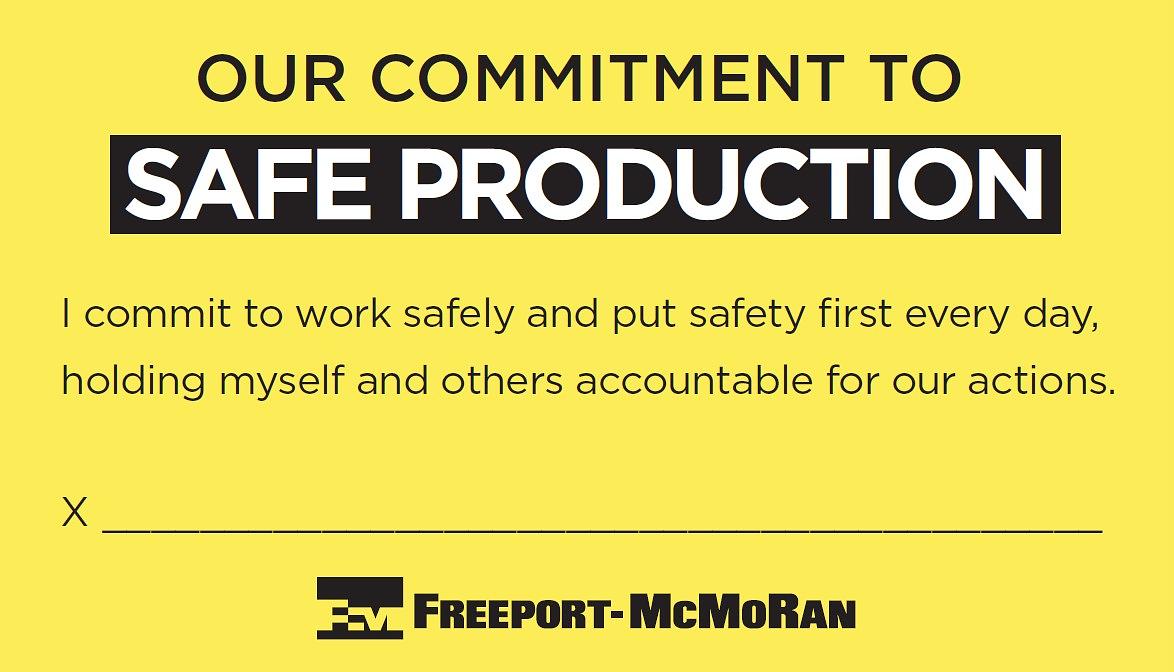Signs that the company’s intense focus on safety is paying off, autonomous haul truck deployment at Bagdad and an optimistic outlook for copper demand have Freeport-McMoRan well positioned for long-term success, said Josh Olmsted, President and Chief Operating Officer-Americas during a recent virtual town hall with employees.
New initiatives to focus everyone’s attention on safe production seem to be producing results, Olmsted said during the hour-long event, which was live streamed to more than 2,300 employees. June was the best month of the year in terms of reportable accidents, a trend he hopes to continue by staying focused on the organization’s safe production plans.
The company also is embracing the technology of the future as it converts its Bagdad haul truck fleet to be fully autonomous over the next three years, Olmsted said. Production in the Americas finished strong in the second quarter of 2023, about 12 million pounds ahead of forecast, he said in the wide-ranging discussion. Costs also were lower than anticipated.
Olmsted was joined at the quarterly event by Justin Cross, Vice President-Operational Improvement, and David Elliott, President, Freeport-McMoRan Sales Co. Emerging mining technologies, including automation and electrification of haul trucks, dominated the 30-minute question-and-answer session that followed the opening remarks.
 To demonstrate a recommitment to working safely, Josh Olmsted reminded employees to sign and carry the safety commitment card being sent to them.Continued safety emphasis
To demonstrate a recommitment to working safely, Josh Olmsted reminded employees to sign and carry the safety commitment card being sent to them.Continued safety emphasis
Olmsted said there has been improvement in the company’s safety performance, which has been marred previously by an unacceptable rate of injuries and accidents. Olmsted later stressed that the safety success experienced in June doesn’t mean the job is finished, but rather an indication of the need to focus on continually driving improvement moving forward.
An effort Olmsted expressed optimism about is the one to reinforce safety expectations through dedicated safety discussions. This includes the distribution of safety commitment cards for employees to sign and carry as a reminder of the importance and expectations of working safely. Olmsted even displayed the card he signed. The cards and site-wide discussions are an attempt to focus workers on taking responsibility for their own safety and that of others, Olmsted said.
“The whole purpose of that was to generate conversations around safety, around what our expectations are for safety and the need for all of us to be accountable for our safe production results,” Olmsted said.
Driving future technology
Over the next three years, the haul trucks at Bagdad will be retrofitted with self-driving technology, making it the first large mine site in the United States with an autonomous haul fleet, Olmsted said. The transformation will help position the company to embrace emerging technology while increasing operational efficiency and safety.
Site leaders will work closely with existing drivers to help ensure they get the training needed to transition to other jobs at the site or within the company, Olmsted said. The new technology will require specialized technicians to keep the autonomous equipment operating both in the trucks and throughout the mine.
“We recognize there is going to be a need to help people retrain or train for different roles than they have today,” he added in response to an employee question about job security. “We will upskill our folks, get you the training you need to go to places you want to go or do what you want to do.”
The changeover will begin with switching the dispatch system and ensuring communications connectivity throughout the pit, which is essential to operating an autonomous system, Cross said. Self-driving trucks will be introduced a few at a time and probably kept isolated to avoid mixing them in with human-operated trucks until, eventually, the fleet is all autonomous.
“One of the most attractive things about the technology is the safety performance,” Cross said. “Over the past 10 years, there hasn’t been a lost-time accident associated with the autonomous technology. There’s something to be said for that. Haulage is a very high-risk area typically. We manage that well, but that aspect is very attractive.”
There is no current plan for autonomous haul trucks at other company sites or to convert other equipment such as shovels, Cross said.
Green energy drives copper’s future
In his comments about current market conditions, Elliott said low stockpiles of copper and anticipated future high demand driven by the conversion to green energy systems has kept the market strong and stable, despite global economic challenges. Stockpiles of copper are the lowest they have been since 2006.
